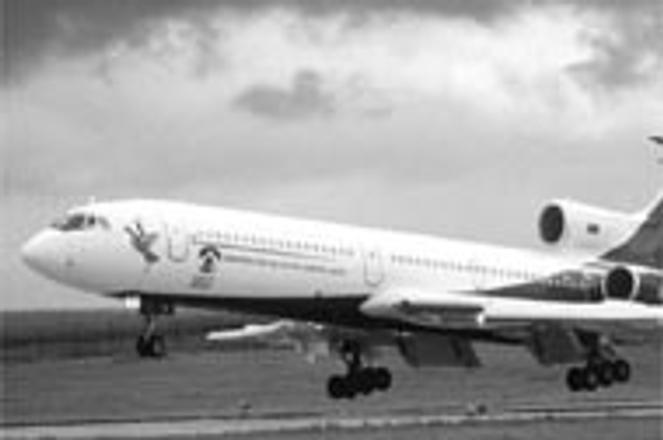Grounded. Slovakia's largest carrier, Slovenské Aerolínie, has had its license revoked.Courtesy of SA
Slovakia's airline sector has been in turmoil since the Slovak government decided to suspend the license of the largest domestic carrier, Slovenské Aerolínie, as of November 16. The suspension, which was enforced by the ministry for "long-term problems" regarding the airline, has not been explained by either the ministry or the airline, both of whom claimed they had come to a "gentleman's agreement" to keep the matter secret.
But Slovenské Aerolínie's problems have opened a door to the domestic carrier market for competitor Tatra Air. Jean Charles Bemberg, President of Tatra Air, told The Slovak Spectator he had submitted a proposal for state support of his airline to the Ministry of Transport, Post and Telecommunications on November 18. In return for state aid, Bemberg said, Tatra Air pledged to open new destinations and assist in the rehabilitation of Slovenské Aerolínie.
"The [previous] government [under former Premier Vladimír Mečiar] made some big mistakes in the market," Bemberg said. "They chose Slovenské Aerolínie as the national airline and had a 34% vested interest in the company. They operated under the motivation of dominating the market and obliterating all competition because they were driven by the desire to make as much money as possible."
For the last two years, Bemberg continued, Tatra Air had been unable to fully develop their business plan because investors were scared away by the government and because Tatra Air had been forced to struggle against the state. "We lost a lot of time and a lot of money fighting the government," he remembered.
Taking inspiration from the recent change in government, Bemberg said, Tatra Air had submitted a threefold proposal to Transport Ministry state secretary František Kurej. "Tatra Air has a great deal to offer this government and this country," he said. "We only need the opportunity."
The sales pitch
According to Bemberg, the 'opportunity' for his company lies in stepping into the market spot left vacant by its troubled competitor. "Tatra Air guaranteed that we will open new destinations," he reported. The airline currently operates routes to Košice, Prague, and Zurich, but has promised to open new routes to such European cities as Amsterdam, Brussels, Kiev, Milan, and Munich.
The second part of the proposal, Bemberg said, was that "Tatra Air will give the government shares in the airline." The state, he said, might land itself some 10 to 15% of the company, which currently has a market value of around $10 million.
"Finally, Tatra Air promises to solve some of the current problems at Slovenské Aerolínie," Bemberg concluded. "Right now, the government is in bad shape because they have a vested interest in a non-functioning airline," he said. "They lost their license but they still have 120 people and four Russian airplanes" which he deemed as "commercially non-applicable".
Bemberg stated that if his firm's business plan is allowed to develop, Tatra Air will require an additional 130 employees by the end of 1999, making up for many of the airline employees who might lose their jobs with Slovenské Aerolínie.
But Pavol Mladý, general director of Slovenské Aerolínie, scoffed at the notion that SA employees would flock to Tatra Air. "People don't want to work for Tatra Air," he said. "They have a different way of conducting business."
The payback
In return for Tatra Air's largesse, Bemberg said, the state would have three duties towards his airline.
"We want an open and continuous relationship with the government. We want to be informed of policy decisions" regarding the airline market, Bemberg said, adding that Tatra Air had been invited to discussions with the state only once in its three year history.
The second request involves guarantees for bank loans and route licenses. If Tatra Air commits itself to opening the new routes, he explained, the firm must be sure that the venture will be profitable.
Finally, Bemberg said, "the government must publicly and officially admit that they made mistakes in the past." This last demand was the most important element of Tatra Air's proposal, Bemberg said, for the airline was anxious that the current government wash its hands of Slovenské Aerolínie and the air transport policies of the Mečiar administration. "This announcement must be made immediately," he said, "so the government can show they are serious about taking action."
When contacted by The Slovak Spectator, the ministry's Kurej declined to comment on his meeting with Bemberg, and said that approval of the Tatra Air proposal could only come from the Office of the Government. Government office officials refused to comment as well, citing their 'gentleman's agreement' regarding silence on airline industry issues.
But Mladý said that Bemberg was an experienced salesman, and might well convince the government to accept his plan. "He's very good at making promises and convincing people that they will be carried out. It's his strong suit."
Slovenské Aerolínie currently transports over 80,000 passengers annually, while Tatra Air, their nearest competitor, which is expecting a 1998 total of 70,000.


